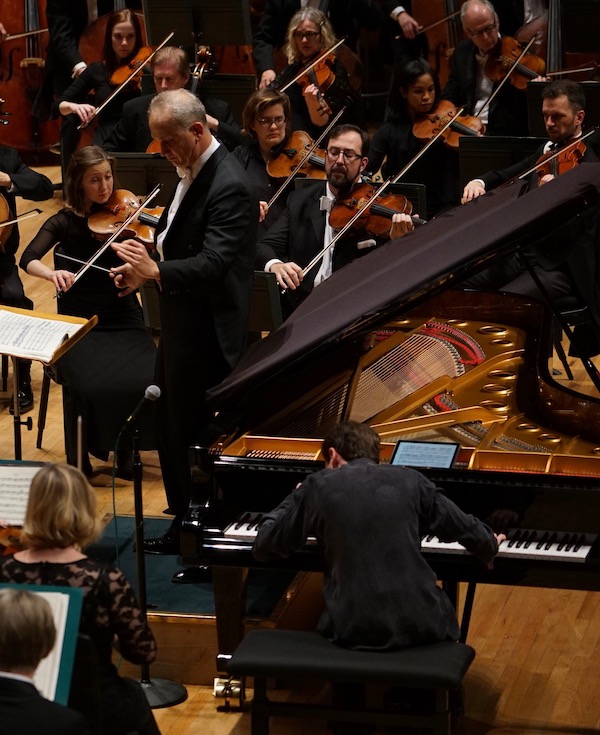Fiery Rachmaninoff and de Falla ballet pair perfectly with the Utah Symphony

Sergei Rachmaninoff’s piano concertos always guarantee a pretty full house whenever the Utah Symphony programs them. Two weeks ago Lukáš Vondráček gave a dynamic performance of the Rhapsody on a Theme of Paganini under the baton of Aziz Shokhakimov. This weekend it’s Boris Giltburg’s turn to dazzle the audience with the Third Piano Concerto and Carlos Miguel Prieto on the podium.
And the young Russian-born Israeli pianist certainly did impress Friday night at Abravanel Hall with an impassioned account ranging from fiery virtuosity in the outer movements to delicate lyricism in the middle movement Intermezzo.
Considered by many to be one of the most difficult concertos, this work puts soloists to a test that Giltburg aced in front of a large and appreciative audience. He drew a huge sound from the Fazioli piano that encapsulated the work’s dynamic virtuosity, but within a clean and impeccable articulation.
Unimposing at the piano, the 35-year-old soloist never allowed the bravura writing to impede the underlying melodicism of the score. Unlike many, and much older, pianists he thankfully let the music speak for itself without unnecessary commentary on his part. And his performance spoke volumes.
Giltburg’s account of the opening Allegro movement was wonderfully nuanced and easily shifted between long, fluid lines underscoring moments of lush expressiveness and nimble dexterity in the overwhelming fiery virtuosity that courses throughout.
The middle movement Intermezzo allowed him to bring his musicality to the fore: The score unfolds slowly, and Giltburg, with finely crafted and executed phrasings, never lost its tender, melancholic thread. Another high point came early in the Intermezzo with principal oboe James Hall’s gorgeous solo.
In the closing third movement, Giltburg again showed his self-assured command of the music. Lighter in character than the first movement, the finale nevertheless is yet another showcase for solo pyrotechnics, and Giltburg didn’t disappoint. His reading was passionate, exuberant and lustrous in its virtuosity.
In all three movements, Prieto offered subtle yet solid accompaniment that mirrored Giltburg’s thoughtful and perceptive approach to the score.
The other substantial work on the program this weekend is the complete ballet score of Manuel de Falla’s El sombrero de tres picos (The Three-Cornered Hat). Written in 1919, the work was commissioned by Russian ballet impresario Sergei Diaghilev and featured the choreography of Léonide Massine. De Falla replaced traditional balletic forms with Spanish dances and, as such, the ballet is an opulent display of Iberian flavors and spirit.
Prieto coaxed a luxuriant sound from the orchestra that captured the music’s richness and vibrant enthusiasm. Working without a score, the Mexican-born conductor showed impressive mastery of the music, never missing the intricate nuances de Falla brought to the work. It was an insightful account — well-delineated and executed, and punctuated alternately with bold gestures and well-crafted lyricism. The orchestra responded wonderfully to Prieto’s direction, playing with rhythmic vitality and clean articulation.
Joining the ensemble was mezzo-soprano and University of Utah faculty member Kirstin Chávez, who brought her resonant and burnished voice to the ballet’s two flamenco songs.
Opening the concert was Mexican composer Silvestre Revueltas’ exotic Sensemayá. Based on a poem of the same name by Cuban national poet Nicolás Guillén the short work is a dramatic piece that’s restless, energetic and dissonant in expression. Sensemayá comes across as a ritualistic dance and feels like a Latin variation on Stravinsky’s The Rite of Spring because of its intensity and relentless drive. Prieto harnessed the power of the score and conveyed it to the ensemble, which played with verve and rhythmic fervor.
Prieto also treated the audience with an unexpected encore: the charmingly captivating Intermedio from late-19th century Spanish composer Gerónimo Giménez’s zarzuela, La boda de Luis Alonso (The Wedding of Luis Alonso).
The program will be repeated 5:30 p.m. Saturday in Abravanel Hall. utahsymphony.org; 801-355-2787. Boris Giltburg returns on March 9 with the Pavel Haas Quartet for a Chamber Music Society of Salt Lake City concert.